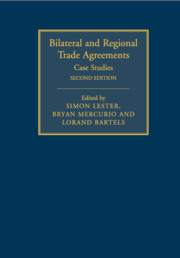Book contents
- Frontmatter
- Contents
- Contributors
- Table of cases
- Table of treaties and international agreements
- List of abbreviations
- 1 The United States–Korea Free Trade Agreement
- 2 EU–Korea Free Trade Agreement
- 3 United States–Colombia Trade Promotion Agreement
- 4 China–New Zealand Free Trade Agreement
- 5 China–Taiwan Free Trade Agreement
- 6 The ASEAN–Australia–New Zealand FTA (AANZFTA)
- 7 The CARIFORUM–EU Economic Partnership Agreement
- Index
1 - The United States–Korea Free Trade Agreement
Published online by Cambridge University Press: 05 December 2015
- Frontmatter
- Contents
- Contributors
- Table of cases
- Table of treaties and international agreements
- List of abbreviations
- 1 The United States–Korea Free Trade Agreement
- 2 EU–Korea Free Trade Agreement
- 3 United States–Colombia Trade Promotion Agreement
- 4 China–New Zealand Free Trade Agreement
- 5 China–Taiwan Free Trade Agreement
- 6 The ASEAN–Australia–New Zealand FTA (AANZFTA)
- 7 The CARIFORUM–EU Economic Partnership Agreement
- Index
Summary
Introduction
The historic US–Korea Free Trade Agreement (FTA), which is the largest FTA since the North American Free Trade Agreement (NAFTA) and the first FTA between major trading nations in North America and Asia, was agreed upon on 2 April 2007 after 14 months of negotiations, and signed on 30 June 2007. Nonetheless, legislatures of the two countries were not able to ratify the FTA after well over four years, until 22 November 2011 for Korea and 21 October 2011 for the United States. Considering that the governments of the two countries were able to sign the controversial FTA after negotiations that continued for only 14 months, this delay in ratifying the agreement is somewhat ironic. The FTA entered into force on 15 March 2012.
The US–Korea FTA faced significant political opposition in the two countries: on 18 December 2008, Korean media reported that a disturbance had erupted in the National Assembly of Korea (i.e., the Korean legislature) during a deliberation of the Foreign Affairs Sub-Committee at which the ruling party attempted to table a motion to pass the US–Korea FTA, a prerequisite procedure for the vote of ratification at the plenary session under the Korean constitution. Representatives of NGOs, academics and former high-level government officials in Korea all expressed concern about the unfairness of the terms of the FTA and possible adverse long-term effects on Korea's economy and society, some of which are elaborated upon in this chapter.
The prospect did not appear very promising in the United States, either. While the Republican administration welcomed the negotiated FTA at the time of its completion, the then Democratic majority leaders in Congress raised objections to its ratification. Hillary Clinton, then US Secretary of State, indicated that the re-negotiation of some of the terms of the US–Korea FTA would be necessary before Congress could ratify it. Even though the United States made important achievements in the negotiations, fulfilling key American interests in the areas of agriculture, pharmaceuticals, intellectual property rights (IPRs), and services, some leaders in Congress doubted whether American automobiles would gain long-awaited market access to Korea as a result of the FTA, and expressed concern that the FTA would further increase Korean exports to America at the expense of US domestic automobile producers.
- Type
- Chapter
- Information
- Bilateral and Regional Trade AgreementsCase Studies, pp. 1 - 38Publisher: Cambridge University PressPrint publication year: 2016
- 3
- Cited by



